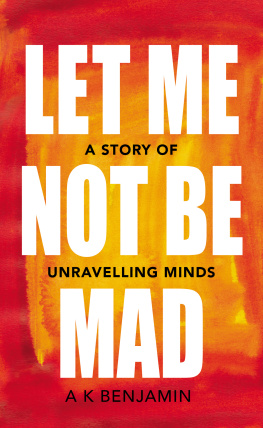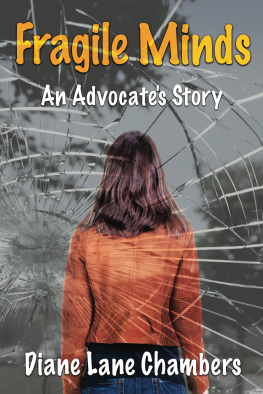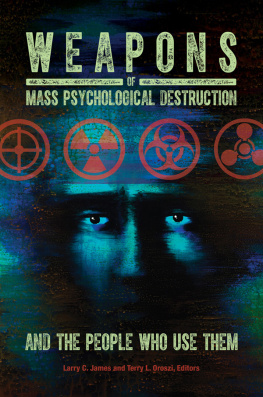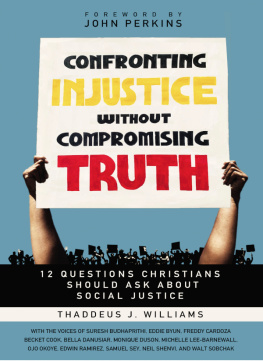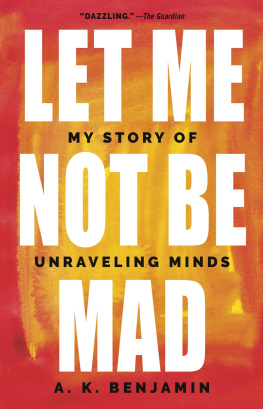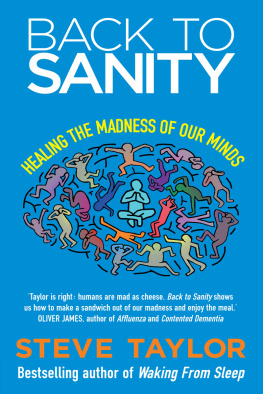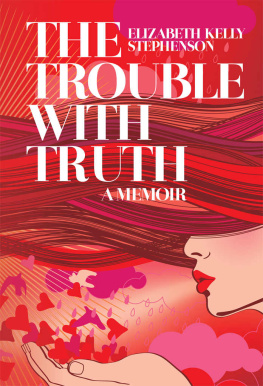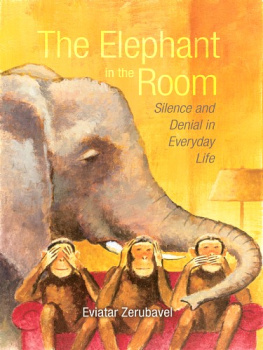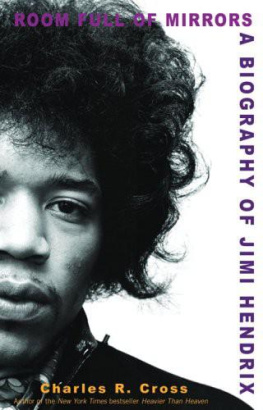Contents
About the Author
A K Benjamin is a Clinical Neuropsychologist, specialising in diagnostics and acute rehab. Previously he was a screenwriter, spent two years as a contemplative monk and has worked at a number of NGOs, with homeless addicts, with gangs and with children with acquired and congenital neurological conditions. He no longer lives in the UK. A K Benjamin is not his real name.
For my daughters
A therapist who reaches the maximum level of empathy would become the patient: the two points of view would become fused.
Valeria Ugazio
Who gives anything to Poor Tom? Whom the foul fiend hath led through fire and through flame, through ford and whirlipool, oer bog and quagmire; that hath laid knives under his pillow, and halters in his pew; set ratsbane by his porridge
William Shakespeare, King Lear
I have hundreds of such memories and from time to time one of them detaches itself from the mass and starts tormenting me. I feel that if I write it down Ill get rid of it.
Fyodor Dostoyevsky
A. K. BENJAMIN
LET ME NOT BE MAD
You
Weve become used to the cameras, TV crews of young men and women with hangovers, haircuts like Frank Gehry buildings, smoking in ambulance bays, idling outside theatre doors, waiting for the next emergency. At first our shirts got crisper, sleeves rolled above the elbow in keeping with Trust policy, and our intonations grew gentler, our questions tender, our eyes sought our patients for the first time in years. Reality was contagious. Nobody was immune, most were naturals. Then it drifted.
Now we file in stage left, the young, the old, the earnest, the furious, the hopeful, the guilty; men, on the whole, though many of us look and sound like boys, most in suits the occasional throwback pince-nez or bow tie a few in scrubs and running shoes; here we come, bound together by some singular idiomatic force, like a caste. We no longer notice the cameras, but its still an act, our entrance a piece of theatre, and there would be no theatre without you, our audience: we file in to collect you.
Rifling medical notes we have only just opened, we bark out names as questions.
Miss Jennifer Almendy?
Mr Konrad Kuchzynski?
Dr Mohammed Mosham Alawi?
We often get them wrong, especially these days, in London. Hopefully one of you will hold up a hand and pull yourself to your feet with the help of a partner or a stick, or wheel yourself forward. But its not uncommon for nothing to happen, for names to die unclaimed, our letters misplaced or not sent or never written, appointments dodged or forgotten by you which might be symptomatic here in General Neurology. Worse still, youre here but its too late: youve lost your speech, cant raise an arm, no longer recognise your own name.
There you are walking across the waiting area to meet me, gait normal. I introduce myself with an ease thats practised smiling, holding out a hand, Please, just call me Ally hoping to relax you (sometimes it has the opposite effect). I lead you down a long corridor, lined with doors that say Epilepsy, Neuro-oncology, Multiple Sclerosis, Chronic Pain, Neurodegenerative Illness Most of you fall silent. I may ask about your journey, if you found us alright, whether youve had a cup of tea. You might answer with thoughtless politeness, or start a story you cant stop, or you dont hear, your mind somewhere beyond the infernal corridors end.
My room is the last on the left. I say mine but I have no home: different days, different rooms. Inside there are no photographs of children or dogs, no Renaissance print of captivated medical students gathered around an exposed cerebrum, no studiedly soothing abstract. Instead, bone-white walls, cold blue trim, strip-lighting, a dull grey desk, a rudimentary chair on each side, a second smaller desk in the corner on which stands a hefty, ageing computer and its monitor (a box in the corner of the screen shows E. coli incidence rates clicking upwards in real time), filing cabinets, shelves with a few outdated textbooks or journals that havent yet been borrowed forever. It might be an interview room in a police station. Years ago we asked Security to install a panic button if not CCTV in case of attack. Nothing happened. Then a red button appeared overnight which makes no sound anywhere when depressed.
We sit facing one another across the desk, just looking, the space between us charging. You are younger than most. Your silver hair is still wet. Theres a whiff of cigarettes mixed with chlorine. The fading impression of goggles like quotation marks around your bright, grey-blue eyes. Eyes: water-bubble light-lassos, the hearts stigmata. At some unspoken level what needs to happen takes a moment, thats all it requires to know the channel is open, that I can see you and everything you bring, however devastating.
The moment passes, then another, and another There was a time when I wouldnt have thought of this as love, but what else could it be?
Before we met there was a more formal introduction; the referral letter. Usually brief notes dictated between professionals with you copied in. At once explicit cold-heartedly so and utterly bereft of detail. Not to complain, I know how busy we are. Yours mentioned general memory difficulties, a few unusual behaviours without elaborating unusual, hinted at a lot of things going on in your life, as though lives werent meant for that. Now in the flesh, tumbling wet hair darkening the shoulders of your silk shirt, the letter laid openly out on the desk, I wince: the casual off-the-rack descriptors your attractiveness, your resilience, your charm as though the last hundred years hadnt happened
Maybe you dont register this, your mind searching for the letters terminus, which comes suddenly, out of nowhere, mid-sentence: whether all this constitutes a psychiatric overlay, likely stress-related? Or is it indicative of incipient organic process?
In other words, anxiety or terminal disease?
Our questions to each other often hinge on such choices, known as differentials, usually pairs of names opposed like bouts: Alzheimers vs Vascular? Alzheimers vs Depression? Alzheimers vs Lewy Bodies? Lewy Bodies vs Parkinsons? Parkinsons vs Progressive Supranuclear Palsy? Progressive Supranuclear Palsy vs Corticobasal Degeneration? And so on. Big names. Title fights. And, on the undercard, the exotica: Prions, Guam, Hiroyamas Syndrome, Erbs Palsy, Gauchers disease, Sanfilippos, Rasmussens, Dandy-Walkers, Wallenbergs, and hundreds, thousands more, an international telephone directory of doom. At its most elemental that is all we are; glorified receptionists, singling out one name from innumerable others, your name, that is, your new name, occasionally with an old-school personal touch, but more often these days as though from a call centre in Hyderabad.
Do you see through the argot? You do; its in your eyes. Its in your eyes because its in mine. What we want to know is if you have the beginnings of a terrible illness, at your young age most likely something that would devastate your functioning within three to five years, destroy you within seven to ten Or are you just being a human being?
Its up to me to actually

